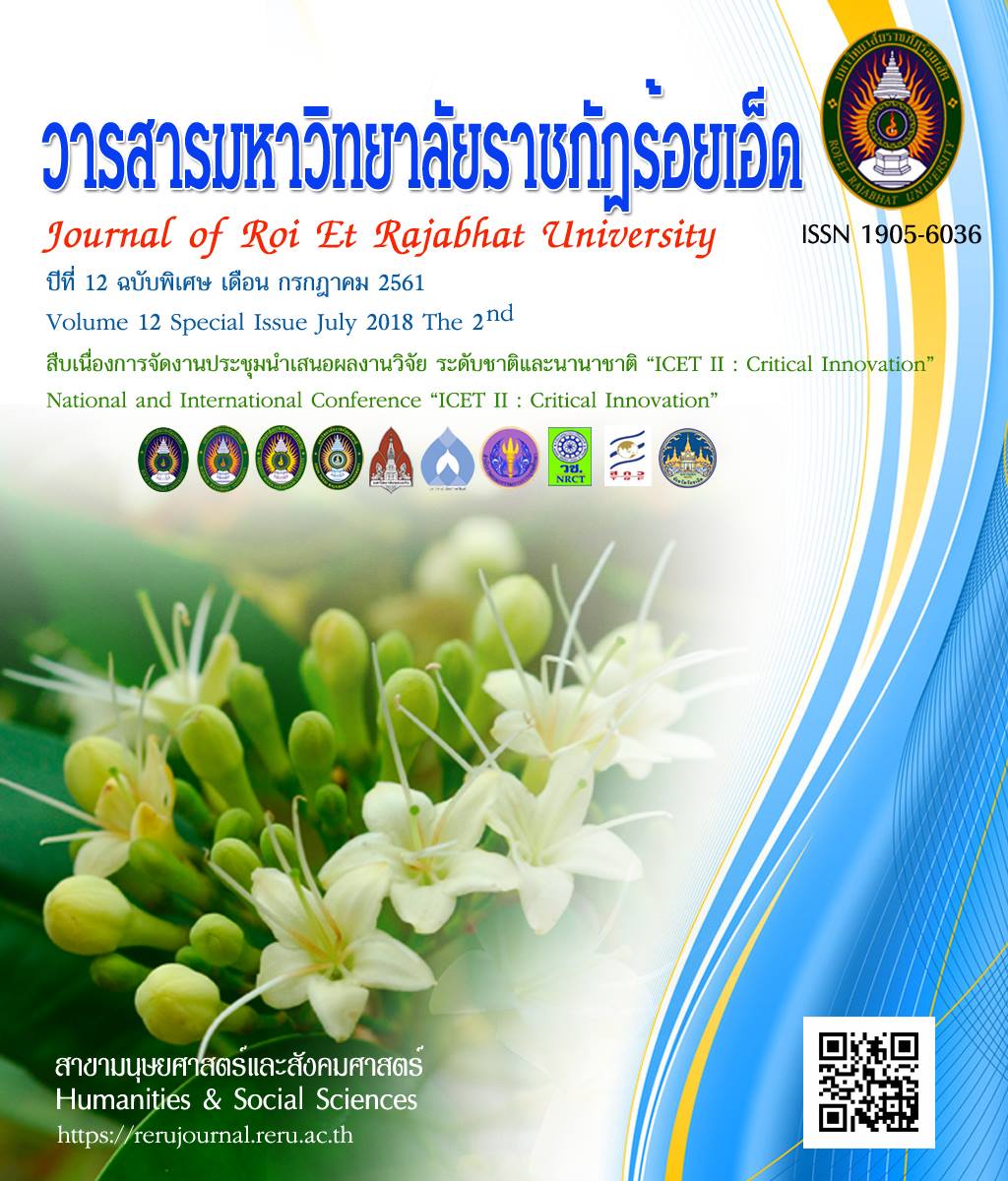The development of WebQuest learning process on scaffolding for information technology subject of Matthayomsuksa 3 students
Keywords:
Webquest, ScaffoldingAbstract
The purposes of this research were 1) to develop the lessons Webquest Learning Process on scaffolding
for Information Technology Subject of Matthayomsuksa 3 students 2) to find the efficiency of the development
of Webquest Learning Process on scaffolding for Information Technology Subject by using Merguigan’s formula.
3) To compare learning achievement toward Control group 4) to study the student’s satisfaction of the Webquest
Learning Process on scaffolding for Information Technology Subject. The sample was students in Matthayomsuksa
3 attending Patiowitthaya School, Patiowitthaya District, Yasothon Province by cluster random sampling
in the second semester of the academic year 2014. The instruments were WBI, Lesson plans, Achievement testand Satisfaction Assessment form. The statistical procedures used for data analysis were arithmetic mean
percentage standard deviation and t – test independent samples. The results of the research were as follows:
1) The process of creating interest and freeing up the basic thinking of the learner's use in modifying.
Planning for immunization screening to improve the quality of the lessons learned on the web, experts
found that the quality of the lessons was at the highest level. 2) Analyze the effectiveness of web-based
learning. Using the process of promoting learning potential. Information Technology Meguigans's standard is
1.11, which is greater than 1.00. Effective Meguigans’s standards. 3) Learning Achievement Among Learners
By using the process of promoting learning potential with the normal group. Find out if the group learned
on the web. The scores of learning achievement were higher than that of normal students. At the .01 level
of significance. 4) Satisfaction of learners with web-based lessons. Using the process of promoting learning
potential. The satisfaction of the students was the most satisfied
References
กมล โพธิเย็น. (2547). รูปแบบการพัฒนาความคิดอย่างเป็นระบบ เพื่อสร้างเสริมความสามารถด้านทักษะการเขียนภาษาไทย
ของนักศึกษาระดับปริญญาตรีโดยใช้แนวคิดทฤษฎีไตรอาร์ขิกและวิธีการแบบสแกฟโฟลด์. วิทยานิพนธ์ ครุศาสตร
ดุษฎีบัณฑิต สาขาวิชาจิตวิทยา ภาควิชาวิจัยและจิตวิทยาการศึกษา คณะครุศาสตร์ จุฬาลงกรณ์มหาวิทยาลัย.
กิตติพงษ์ พุ่มพวง. (2547).เอกสารประกอบการอบรมเชิงปฏิบัติการ SEQIP Workshop 2, คู่มือการใช้งาน Moodle (เวอร์ชั่น
1.4.2) สำหรับผู้สอน,โครงการศึกษาไร้พรมแดน : มหาวิทยาลัยเทคโนโลยี สุรนารี.
กฤษมันต์ วัฒนาณรงค์. (2543). E – Learning & Web – Based Learning. กรุงเทพฯ : ศูนย์ผลิตตำราเรียน สถาบันเทคโนโลยี
พระจอมเกล้าพระนครเหนือ.
ไชยยศ เรืองสุวรรณ. (2546). การออกแบบและการพัฒนาบทเรียนคอมพิวเตอร์และบทเรียนบนเครือข่าย : เอกสารประกอบ
การสอนวิชา 0503860. พิมพ์ครั้งที่ 6. มหาสารคาม :อภิชาตการพิมพ์.
ดวงกมล สวนทอง. (2556). การวิจัยและพัฒนารูปแบบการสอนสแกฟโฟลด์ที่ส่งเสริมจิตลักษณะฉันทะและความสามารถ
ในการเขียนบทความวิชาการของนักศึกษาสถาบันการพลศึกษา วิทยาเขตเพชรบูรณ์. ปริญญานิพนธ์วิทยาศาสตร
ดุษฎีบัณฑิต สาขาวิชาการวิจัยพฤติกรรมศาสตร์ประยุกต์ บัณฑิตวิทยาลัย.
มนต์ชัย เทียนทอง. (2544). WBI (Web-Based Instruction). การศึกษาตามมาตรฐาน : แนวคิดสู่การปฏิบัติ. กรุงเทพฯ : แม็ค.
สนิท ตีเมืองซ้าย. (2552). การพัฒนารูปแบบการเรียนรู้ร่วมกันโดยใช้ปัญหาเป็นหลักที่มีการช่วยเสริมศักยภาพทางการเรียน
ผ่านเครือข่ายคอมพิวเตอร์. วิทยานิพนธ์ ปรัชญาดุษฎีบัณฑิต สาขาคอมพิวเตอร์ศึกษา มหาวิทยาลัยเทคโนโลยี
พระจอมเกล้าพระนครเหนือ.
สุมาลี ชัยเจริญ.(2547). ทฤษฎีคอนสตรัคติวิสซึม. ขอนแก่น :ภาควิชาเทคโนโลยีการศึกษาและศึกษาศาสตรมหาวิทยาลัยขอนแก่น.
Chen, F-S. & Hsiao, Y-W. (2010). Using WebQuest as a creative teaching tool at a science and technology
university in Taiwan. World Transactions on Engineering and Technology Education-WIETE 8(2),
203-206.
Hannafin M., Susan L., and Kevin O. (1999). Open Learning Environments: Foundations, Methods, and
Models. In Charles M. Reigeluth (ED), Instructional Design Theories And Models: A New Paradigm
of Instructional Theory. Volume II. Newjersy: Lawrence Erlbaum Associates.
Wood, D.; Bruner, J.; & Ross, G. (1976). The role of tutoring in problem-solving. Journal of Child Psychology
and Psychiatry. 17(2):89-100.
Downloads
Published
How to Cite
Issue
Section
License
บทความที่ได้รับการตีพิมพ์เป็นลิขสิทธิ์ของวารสารมหาวิทยาลัยราชภัฎร้อยเอ็ด
ข้อความที่ปรากฏในบทความแต่ละเรื่องในวารสารวิชาการเล่มนี้เป็นความคิดเห็นส่วนตัวของผู้เขียนแต่ละท่านไม่เกี่ยวข้องกับมหาวิทยาลัยราชภัฎร้อยเอ็ด และคณาจารย์ท่านอื่นๆในมหาวิทยาลัยฯ แต่อย่างใด ความรับผิดชอบองค์ประกอบทั้งหมดของบทความแต่ละเรื่องเป็นของผู้เขียนแต่ละท่าน หากมีความผิดพลาดใดๆ ผู้เขียนแต่ละท่านจะรับผิดชอบบทความของตนเองแต่ผู้เดียว





